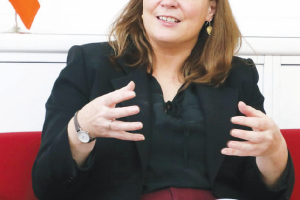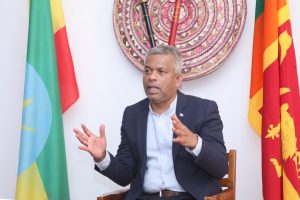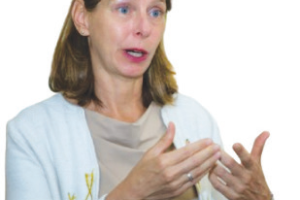H istory is the best mirror to reflect on our past, to analyze where we are now and to manage the future. It showcases the past affording readers a window about forefathers and actions that took place in the past. History is the most interesting field of study. It has a great role in molding the future. Bright and dark spots are evidenced in the annals of every nation’s history. They are helpful to hammer home that the bad must not to be repeated again. They as well could be used to promote and strengthen unity, hard work and patriotism, among others. The Ethiopian Herald had a while with a scholar on Ethiopian History.
Today’s guest is Professor Tesema Ta’a. He was born in 1948 at Eastern Wollega, Yato village. He attended his elementary and secondary school educations at Evangelical Missionary School. He grew up learning both spiritual and formal educations. Though he scored a grade to join Wingate School, he lost the chance due to lack of information about the examination’s time. After leaving school, he joined Teachers Training Institute at Harar.
After taking pedagogical and formal educations, he completed his training and began teaching difrent subjects at different elementary schools. He earned his BA and MA from Addis Ababa University. He was one of the first MA graduates After earning his MA, he served as the Vice President of Addis Ababa University College of Social Science and Humanities. He had made several researches revolving around the socio-cultural aspects of the Ethiopian people. He focused more on the Oromo people and their culture.
The Yejju dynasty and the 16th century’s Oromo expansion formed the kernel of his research. Oromifa speaking people, who resided in Kenya, were included. Then he left to America in 1984 to pursue his PhD at Michigan University. He worked hard to serve his country with great honor. After many years in instructing and researching, he was accoladed with full professorship in 2008 from Addis Ababa University. He is still teaching and conducting researches at Addis Ababa University (A.A.U) Herald: What is history? Professor Tesema: It is a study of the past. It was defined by historians in different ways. History is the study of the past, analysis of the present and foreseeing of the future. It connects the three time zones.
History is an antidote to somebody who does not know from where he came, who cannot tell where he is and never knows where he will be going. Continuum of events, activities of people and mistakes of forefathers are vividly depicted by history. The greatness of the present and what would occur in the future are explained by history. Everything in the world has history. There is no human being without history. Even a given walk of life has its own history. For example; Biology, Chemistry, Environment, Urban, Rural and other fields are studied by history. Generally, the global world of today is explained by its history. The bad thing is people seem remiss in drawing lessons learnt from history.
“What experience and history demonstrate to us is that people and governments have never learned any thing from history, nor did they act on principles deduced from it, says Georg Wilhelm Friedrich Hegel.”Because people are seen again and again committing the mistakes that already happened. The same thing is seen happening in our country. We should learn from history. Broadening one’s mind and reading comes from history. It teaches people a lot.
Herald: What is the significance of arming this generation with the history of the country?
Tesema: Ethiopian history is no different from the history of any other country in the world. World’s history is controversial. History cannot be written without evidence. One has to have tangible, concrete and authentic evidences to write history of a society as well as a country. Hearsays and fictions cannot be taken as history. The best way to write history is being an eyewitness. Historians, involved in the event, could better account for the action. Historians do not claim that they write a real history. But relatively they get nearer to it. Most of their messages are to be inferred.
The dimension of historical writers should not be personal interpretation or individuals’ perspective. If you have direct perspective, your thought would be accepted. Teaching the real history to the generation is very important in creating a better generation. People cannot live without history. It is the most essential tool to know where we began, where we are and where we would be going. It helps the generation know where their country is found on the timeline. In addition, it helps to make their country strong. In other hands, it helps them to research and to identify the problems and rewrite them in a proper and inclusiveness way.
Herald: How did you see EPRDF’s move to strike out history courses from high schools and common courses from of universities?
Tesema: It tried to pursue a human development philosophy of 30 percent to social science and 70 percent to natural science. This should have been revised long time ago. We had been complaining in vain the cancellation of the courses. We have been asking Ministry of Education for its inclusion in the curriculum. EPRDF should have tabled its intention for discussion before implementing it. It was better if they tried to give the courses helped by ICT than cancelling it. To make it palatable some spices could have been added to it in order to create better awareness and knowledge about one’s country’s history and let the freshman students know about their country. In addition, it helps students to know who is who. So, these should be seriously seen and changed to create better history and knowledge about the country.
Herald: Some say the government undermined the history of the country to a century, what is your take on that?
Tesema: The question is not on the downsizing attempt. It should be about the interpretation, or the general makeup of the country. Historical sources are important in making and remaking the country. Those who are saying the country’s history is only 100 years long are simply talking about the history of modern Ethiopia with its boundaries. Ethiopia managed to demarcate the current boundaries during the colonial era. There had been boarder expansion and also contractions in making of modern Ethiopia. Previously, due to the exposure they had to the outside world, the northern parts of the country were ruling Saudi Arabia.
That was ancient historical period which doesn’t include modern Ethiopia. That is very vivid. Everyone should see things with peeled eyes. The medieval period has its own history. It was a new phenomenon. It was a time of war between the northern Christian kingdom and Muslim Sultanate to expand their realm. It had international dimension. It was a time capitalism started to expand.
The gate to Asia was closed by Ottoman Turkey. Due to this, the European started to find new ways to find spices. In the war among Ethiopians, Ottoman supported the Muslim Sultanate and the Portuguese helped the Christian kingdom. Externally, there was the movement of Cushitic people including the Oromo, Sidama, Somali, Hadiya, Afar, among others. The way I see this history is connected to the then global movement. The Bantu’s were expanding towards North West from Kenya.
The Christian and the Muslim were responsible to shape the then history. Both the Christian and the Muslim were fighting each other supported by foreigners. During the Cushitic expansion, the Oromos were well organized. They renewed the Gada System and got mobilized under Abba Duulaa, Abba Bokkuu, Abba Gadaa, among others. They were well-organized and very strong force. There wereOromos on the Shewa Plato’s. From the beginning the movement of the Cushitic was from north to south.
The 16th century’s movement was not expansion it was rather recapturing original homeland. It was a movement to the motherland of the Oromos. In ways back to home, the Oromos who were left on the northern mountains helped the movement to be successful within a short period of time. The current historians understood the population expansion as not taking the lands that belonged to somebody else. There was a distortion of the Oromo history.
There is a call for mending this through evidence tracing, primary sources and chronicles. In general, the 16th century was the turning point of expansion ways back to home for the Oromo people. The Muslims and Christians were repulsed back where they came. Due to this, the Oromo people were living in freedom for 400 years thanks to the Gada system.
Currently, the people who are talking about the history of a century are talking about the international boundary of Ethiopia. This goes back to the battle of Adwa held in 1896. It was the time when the southern Ethiopia’s boundaries were demarcated. It does not mean that the country has no history before that. But we have to distinguish modern Ethiopia. The growth witnessed in the era of Menelik II was three fold big than the former period. It comprised three fourth of the country’s history. That is why everyone is talking about a century’s history.
Herald: How did you see the Oromo’s contribution to Ethiopia?
Tesema: Whether one likes it or not, politics is a different matter. Historical knowledge is another thing. So, we have to be more practical and accept the reality. Therefore, in terms of protecting the country from north to west and south to east, Oromos have contributed a lot. Especially, in the battle of Adwa defeating Italian troops without the Oromo cavalry or horsemen was unimaginable.
This is a historical truth that cannot be denied. Top on the heroes’ list are found Gebayehu Gurmu and Balcha Safo. The Oromo people are at the heart of the country’s history. But their history was not written properly. Even during the second Italian war people like Abdisa Aga, Geresu Duki, Olika Dengil, Bekele Beyan, File Mendara, Dukuma Jeldesso, Mekonen Jembare, Tesema Guluma, Abichu and so many others were the heroes of the Oromo people that contributed to the country.
They crashed fascists with very great patriotic forces. Herald: Lack of historical knowledge is posing a problem on the country, what should the current generation do to strength unity of the country? Tesema: History is a mirror. The generation has to learn from history. They should have the right perspective of the country. The younger generation has to learn from history and write history conducting research. Doing so, they have to disseminate it. Much is expected from this generation. There should be a sense of equality and fairness. The history of this country is permeated by the history of churches and the state. The history of the people should be written too. This, among others, is what is expected from this generation.
Herald: Some say history has to be deconstructed for all-inclusiveness, what do you say about this?
Tesema: To rewrite the history of this country we have to do two things. First, we have to mend distortions of the past. Even history of the past is written as if some citizens belonged not to this country. There are so many local and foreign writers who acted this way.
Though the Gada system is one of the ancient civilizations, the Oromo people did contribute a lot to this world. But few historians wrote as if people in this set contributed nothing to the country. Therefore, we have to write the history of this country. Most of the histories of this country were written by foreigners, especially Jews. Harold Marcus, Leonard Gravy, Levy, Hulendorf and many others. They wrote the country’s history in such a way to connect the Ethiopian history with the Solomonic dynasty. The leaders and Ethiopian kings had been ruling the country for 226 six years through this line.
They wrote all history to expand their own agenda. The country’s history should be written based on peoples’ culture, oral historiography and current settlement as connected to the past and others. The history of the country should be written in such a way it includes all citizens in the country.
Herald: Hatred books and speeches made in the past are being causes for violence and crisis in the country, what is your take on this?
Tesema: The history of this country is written in a manner that undermines others. Aba Bahre’s book is a typical example for this. He is mysterious by himself. Even the history of the author is not known. He wrote a history book of only twelve pages in Ge’ez language. I think he was a man displeased by the 16th century movements of the Oromos, who were strong under the Gada system. Currently, many are claiming some beautiful places without knowing and having enough knowledge about the area. That has to be underscored. The past mistake should be removed. A new or all inclusive history should be birthed.
Herald: What makes Ethiopia unique as compared to the rest of African countries?
Tesema: One of the brightest spots in Ethiopian history is the battle of Adwa. There were many countries who fought against the whites like; Samori Toure in West Africa, Shona in the South, Lobengula in Zimbabwe and Moshosho in South Africa. Many countries, from the west to east and from north to south of the continent, did wage a fierce fight against white colonizers. But, only Ethiopians defeated and chased them out.
As such, Ethiopia turned out to be the talk of black people world over. That is what makes the Ethiopia unique. Due to this, the country has become a beacon light or model and an example for all African countries. Ethiopia has played a great role when it comes to African issues. Many freedom fighters were trained here. Like Nelson Mandela and so many others. Whoever the leader was the country stood firm in being as a pride for all. All Africans sought support from Ethiopia in the long towards freedom.
Herald: How do you summarize Ethiopian history?
Tesema: The country has a great history that stands shoulder high in the world history. It is exemplary and a source of pride for all. We have things that would have united the country. The other things are biases on some history of the country’s people. This should stop somewhere. In addition, the history of real contributors and patriots of the country should be written and recognized.
There should be ethno-history and efforts to recognize them all. The right views and perspectives of the country should be taught to this generation. The distorted facts should be eliminated. The Gada system, the Luba and the Mehaber should be taught from the nursery class upward. In general, the History of both the victor and victims should be recognized and properly conveyed so as to draw lessons from them.
Herald FEBRUARY 3/2019
BY AMBO MEKASSA





Select the member registration page and fill in your information according to the steps on the screen สล็อตเว็บตรง
If you encounter any technical problems with registration or the website website
please contact our support team at any time. สล็อตวอเลท
We are ready to provide the best service to all our players. here
Rest assured that you can make money with PGSLOT 24 hours a day. click
Slot games are easy to play and profitable. slot
But when it comes to playing for real สล็อตออนไลน์
many players often have problems because they don’t understand the game system. check
Some people lose, but they don’t understand why they lose. wm787play
So you need to understand slot games deeply first. wm787play.xyz